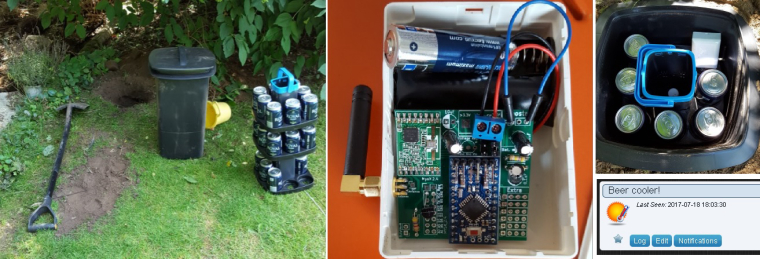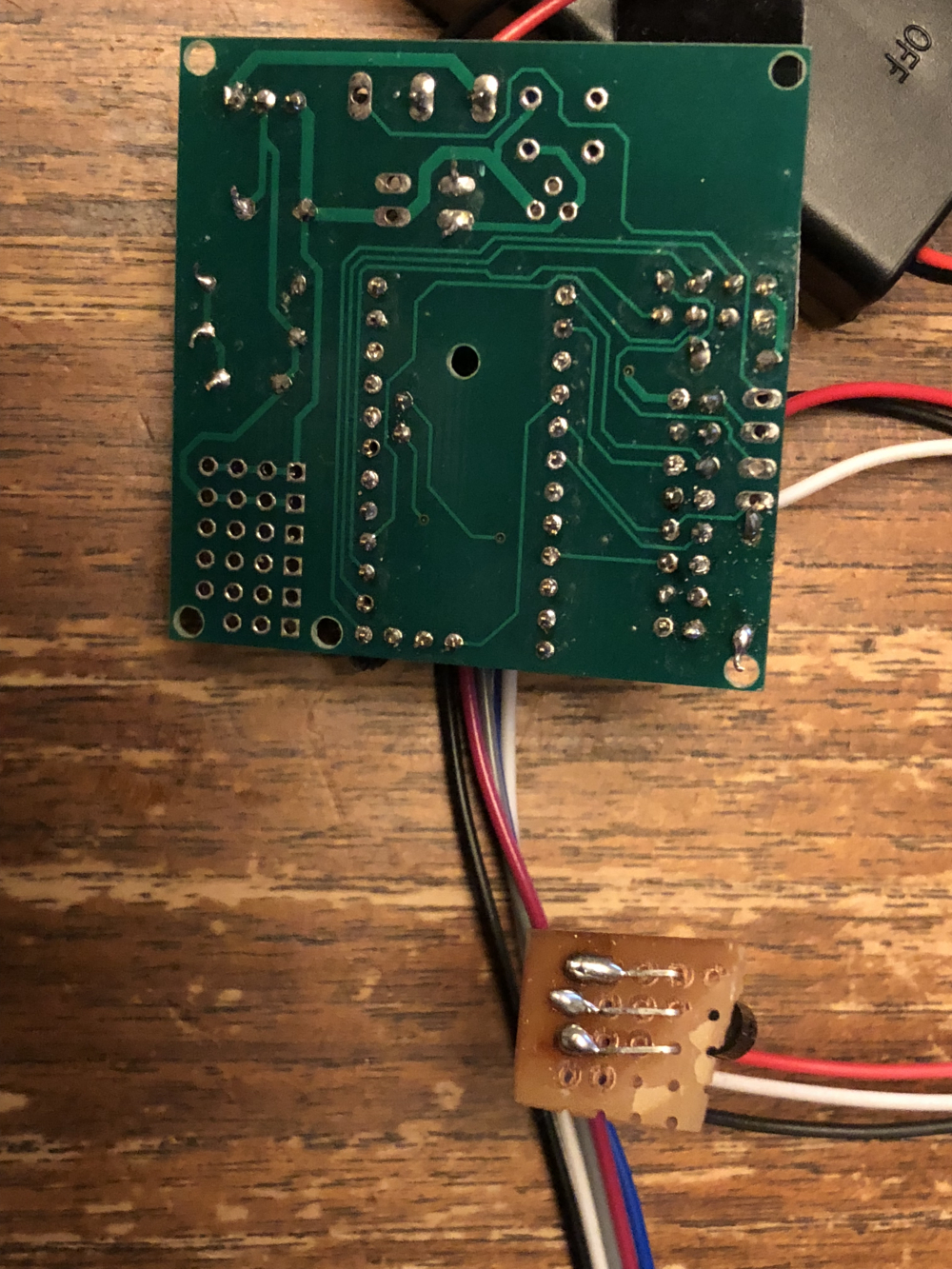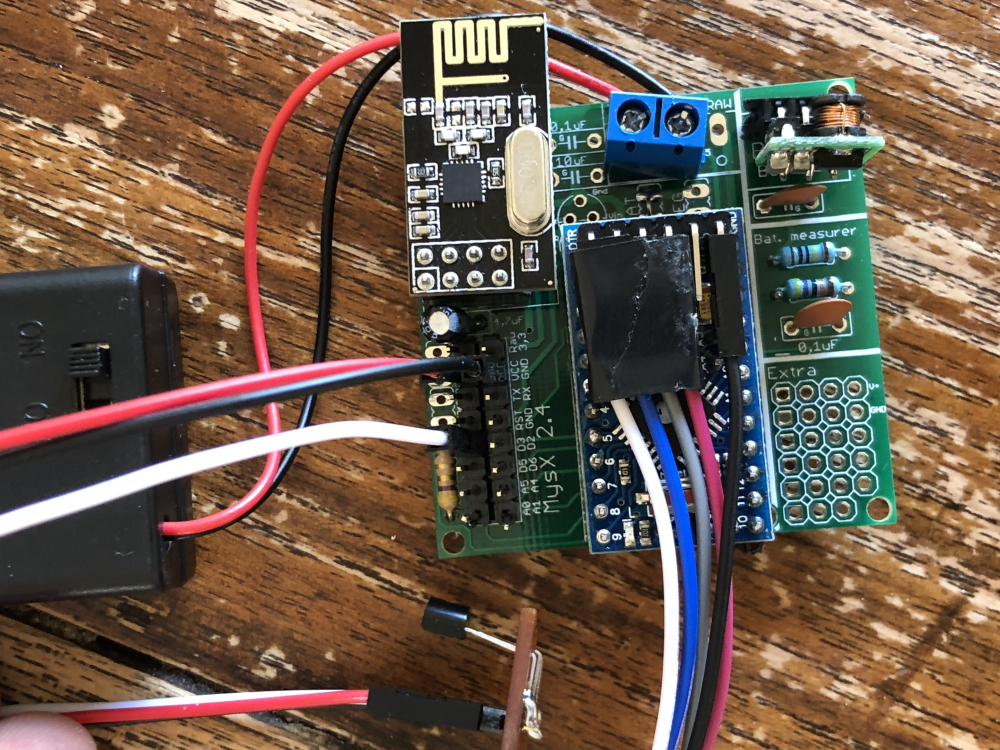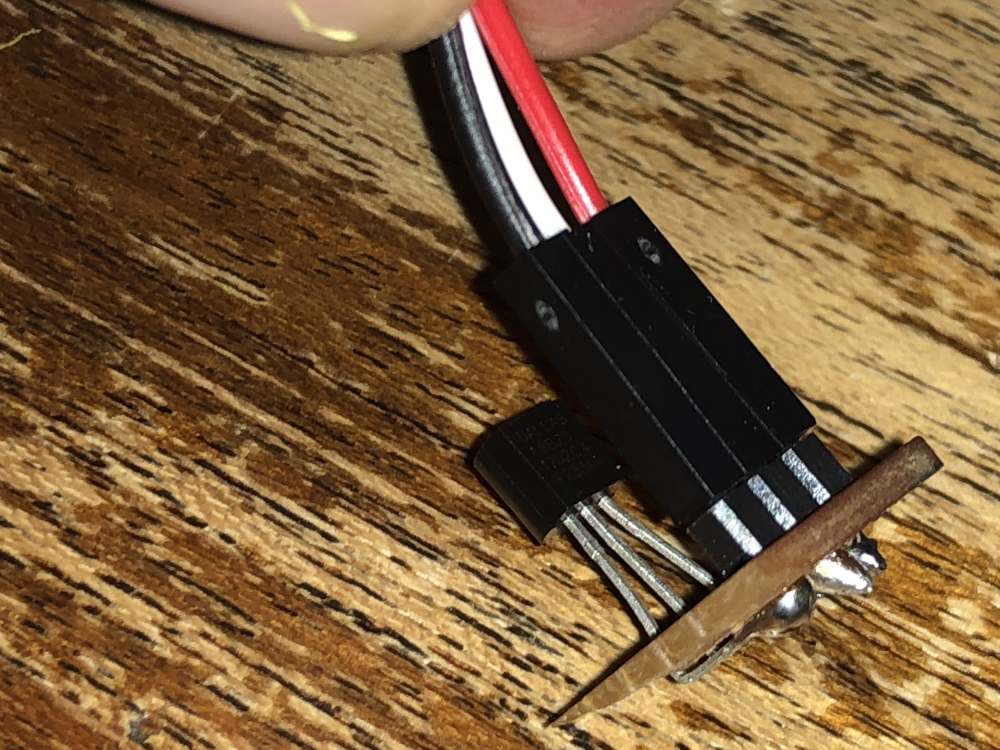I have a newbie-pcb board with a Dallas temperature sensor attached. I mixed some sketches together to make it work.
When starting the sensor the first time I can see all the actions performed. Reading temperature and battery percentage. But than after sleeping it is only reading and sending battery percentage (no voltage)? No temperature action is visible any-more. So, there must be a fault in my sketch which makes it read the temperature part only once? Any advice on this? Thanks.
[code]
/**
* The MySensors Arduino library handles the wireless radio link and protocol
* between your home built sensors/actuators and HA controller of choice.
* The sensors forms a self healing radio network with optional repeaters. Each
* repeater and gateway builds a routing tables in EEPROM which keeps track of the
* network topology allowing messages to be routed to nodes.
*
* Created by Henrik Ekblad <henrik.ekblad@mysensors.org>
* Copyright (C) 2013-2015 Sensnology AB
* Full contributor list: https://github.com/mysensors/Arduino/graphs/contributors
*
* Documentation: http://www.mysensors.org
* Support Forum: http://forum.mysensors.org
*
* This program is free software; you can redistribute it and/or
* modify it under the terms of the GNU General Public License
* version 2 as published by the Free Software Foundation.
*
*******************************
*
* REVISION HISTORY
* Version 1.0: Henrik EKblad
* Version 1.1 - 2016-07-20: Converted to MySensors v2.0 and added various improvements - Torben Woltjen (mozzbozz)
*
* DESCRIPTION
* This sketch provides an example of how to implement a humidity/temperature
*
* Dallas temperature sensor DS18B20
*
* For more information, please visit:
* http://www.mysensors.org/build/humidity
*
HTU21D Humidity Sensor
Hardware Connections (Breakoutboard to Arduino):
-VCC = 3.3V
-GND = GND
-data = D3 met pcb 470 uf resistor
*/
#define MY_NODE_ID 4
#define MY_PARENT_NODE_ID 0
#define MY_PARENT_NODE_IS_STATIC
// Enable debug prints
#define MY_DEBUG
// Enable and select radio type attached
#define MY_RADIO_NRF24
//#define MY_RF24_PA_LEVEL RF24_PA_HIGH
//#define MY_RADIO_RFM69
//#define MY_RS485
#include <MySensors.h>
//#include <Wire.h>
#include <SPI.h>
#include <OneWire.h>
#include <DallasTemperature.h>
// Force sending an update of the temperature after n sensor reads, so a controller showing the
// timestamp of the last update doesn't show something like 3 hours in the unlikely case, that
// the value didn't change since;
// i.e. the sensor would force sending an update every
//UPDATE_INTERVAL*FORCE_UPDATE_N_READS [ms]
//static const uint8_t FORCE_UPDATE_N_READS = 10;
#define COMPARE_TEMP 0 // Send temperature only if changed? 1 = Yes 0 = No
// arrays to hold device address
DeviceAddress insideThermometer;
#define ONE_WIRE_BUS 3 // Pin where dallas sensor is connected
#define MAX_ATTACHED_DS18B20 1
unsigned long SLEEP_TIME = 30000; // Sleep time between reads (in milliseconds)
OneWire oneWire(ONE_WIRE_BUS); // Setup a oneWire instance to communicate with any OneWire devices (not just Maxim/Dallas temperature ICs)
DallasTemperature sensors(&oneWire); // Pass the oneWire reference to Dallas Temperature.
float lastTemperature[MAX_ATTACHED_DS18B20];
int numSensors=0;
bool receivedConfig = true;
bool metric = true;
#define CHILD_ID_TEMP 1
#define CHILD_ID_BATTERY 2
#define CHILD_ID_VOLT 3
//#define CHILD_ID_PRCNT 3
float lastTemp;
//float lastHum;
uint8_t nNoUpdatesTemp;
//uint8_t nNoUpdatesHum;
//boolean metric = true;
void presentation()
{
// Send the Sketch Version Information to the Gateway
sendSketchInfo("Temperature Sensor", "1.1");
// Register all sensors to gw (they will be created as child devices)
// present(CHILD_ID_HUM, S_HUM);
present(CHILD_ID_TEMP, S_TEMP);
present(CHILD_ID_BATTERY, S_MULTIMETER);
metric = getControllerConfig().isMetric;
// Fetch the number of attached temperature sensors
numSensors = sensors.getDeviceCount();
// Present all sensors to controller
for (int i=0; i<numSensors && i<MAX_ATTACHED_DS18B20; i++) {
present(i, S_TEMP);
}
}
int BATTERY_SENSE_PIN = A0; // select the input pin for the battery sense point
//unsigned long SLEEP_TIME = 60000; // Sleep time between reads (in milliseconds) 60000
static int oldBatteryPcnt = 0;
//Create an instance of the object
MyMessage msg(0,V_TEMP);
//MyMessage msgHum(CHILD_ID_HUM, V_HUM);
MyMessage msgTemp(CHILD_ID_TEMP, V_TEMP);
MyMessage msgBattery(CHILD_ID_BATTERY, V_VOLTAGE);
//MyMessage msgBattery(CHILD_ID_BATTERY, V_PRC);
void setup() {
// Startup up the OneWire library
sensors.begin();
// use the 1.1 V internal reference
#if defined(__AVR_ATmega2560__)
analogReference(INTERNAL1V1);
#else
analogReference(INTERNAL);
#endif
// requestTemperatures() will not block current thread
sensors.setWaitForConversion(false);
}
void loop()
{
// Fetch temperatures from Dallas sensors
sensors.requestTemperatures();
// query conversion time and sleep until conversion completed
int16_t conversionTime = sensors.millisToWaitForConversion(sensors.getResolution());
// sleep() call can be replaced by wait() call if node need to process incoming messages (or if node is repeater)
sleep(conversionTime);
// Read temperatures and send them to controller
for (int i=0; i<numSensors && i<MAX_ATTACHED_DS18B20; i++) {
// Fetch and round temperature to one decimal
float temperature = static_cast<float>(static_cast<int>((getControllerConfig().isMetric?sensors.getTempCByIndex(i):sensors.getTempFByIndex(i)) * 10.)) / 10.;
// Only send data if temperature has changed and no error
#if COMPARE_TEMP == 1
if (lastTemperature[i] != temperature && temperature != -127.00 && temperature != 85.00) {
#else
if (temperature != -127.00 && temperature != 85.00) {
#endif
// Send in the new temperature
send(msg.setSensor(i).set(temperature,1));
// Save new temperatures for next compare
lastTemperature[i]=temperature;
}
}
// some delay here
//delay(500);
// get the battery Voltage
int sensorValue = analogRead(BATTERY_SENSE_PIN);
delay(500);
#ifdef MY_DEBUG
Serial.println(sensorValue);
#endif
// 1M, 470K divider across battery and using internal ADC ref of 1.1V
// Sense point is bypassed with 0.1 uF cap to reduce noise at that point
// ((1e6+470e3)/470e3)*1.1 = Vmax = 3.44 Volts
// 3.44/1023 = Volts per bit = 0.003363075
int batteryPcnt = sensorValue / 10;
#ifdef MY_DEBUG
float batteryV = sensorValue * 0.003363075;
Serial.print("Child ID ");
Serial.print(CHILD_ID_BATTERY);
Serial.print("Battery Voltage: ");
Serial.print(batteryV);
Serial.println(" V");
Serial.print("Battery Percent: ");
Serial.print(batteryPcnt);
Serial.println(" %");
#endif
if (oldBatteryPcnt != batteryPcnt) {
// Power up radio after sleep
sendBatteryLevel(batteryPcnt);
oldBatteryPcnt = batteryPcnt;
}
sleep(SLEEP_TIME); //sleep a bit
}
[/code]```
This is in the serial monitor:
[code]```
16 MCO:BGN:INIT NODE,CP=RNNNA---,VER=2.2.0
26 TSM:INIT
28 TSF:WUR:MS=0
34 TSM:INIT:TSP OK
36 TSM:INIT:STATID=4
38 TSF:SID:OK,ID=4
40 TSM:FPAR
43 TSM:FPAR:STATP=0
45 TSM:ID
47 TSM:ID:OK
47 TSM:UPL
1730 !TSF:MSG:SEND,4-4-0-0,s=255,c=3,t=24,pt=1,l=1,sg=0,ft=0,st=NACK:1
3739 TSM:UPL
5421 !TSF:MSG:SEND,4-4-0-0,s=255,c=3,t=24,pt=1,l=1,sg=0,ft=1,st=NACK:1
7430 TSM:UPL
7477 TSF:MSG:SEND,4-4-0-0,s=255,c=3,t=24,pt=1,l=1,sg=0,ft=2,st=OK:1
7497 TSF:MSG:READ,0-0-4,s=255,c=3,t=25,pt=1,l=1,sg=0:1
7503 TSF:MSG:PONG RECV,HP=1
7507 TSM:UPL:OK
7510 TSM:READY:ID=4,PAR=0,DIS=1
7518 TSF:MSG:SEND,4-4-0-0,s=255,c=3,t=15,pt=6,l=2,sg=0,ft=0,st=OK:0100
7526 TSF:MSG:READ,0-0-4,s=255,c=3,t=15,pt=6,l=2,sg=0:0100
7536 TSF:MSG:SEND,4-4-0-0,s=255,c=0,t=17,pt=0,l=5,sg=0,ft=0,st=OK:2.2.0
7557 TSF:MSG:SEND,4-4-0-0,s=255,c=3,t=6,pt=1,l=1,sg=0,ft=0,st=OK:0
11247 !TSF:MSG:SEND,4-4-0-0,s=255,c=3,t=11,pt=0,l=18,sg=0,ft=0,st=NACK:Temperature Sensor
12939 !TSF:MSG:SEND,4-4-0-0,s=255,c=3,t=12,pt=0,l=3,sg=0,ft=1,st=NACK:1.1
14628 !TSF:MSG:SEND,4-4-0-0,s=1,c=0,t=6,pt=0,l=0,sg=0,ft=2,st=NACK:
16318 !TSF:MSG:SEND,4-4-0-0,s=2,c=0,t=30,pt=0,l=0,sg=0,ft=3,st=NACK:
16324 MCO:REG:REQ
18010 !TSF:MSG:SEND,4-4-0-0,s=255,c=3,t=26,pt=1,l=1,sg=0,ft=4,st=NACK:2
21698 !TSF:MSG:SEND,4-4-0-0,s=255,c=3,t=26,pt=1,l=1,sg=0,ft=5,st=NACK:2
21706 !TSM:READY:UPL FAIL,STATP
25389 !TSF:MSG:SEND,4-4-0-0,s=255,c=3,t=26,pt=1,l=1,sg=0,ft=0,st=NACK:2
29079 !TSF:MSG:SEND,4-4-0-0,s=255,c=3,t=26,pt=1,l=1,sg=0,ft=1,st=NACK:2
31088 MCO:BGN:STP
31137 MCO:BGN:INIT OK,TSP=1
31141 MCO:SLP:MS=94,SMS=0,I1=255,M1=255,I2=255,M2=255
31148 TSF:TDI:TSL
31150 MCO:SLP:WUP=-1
31154 TSF:TRI:TSB
903
Child ID 2Battery Voltage: 3.04 V
Battery Percent: 90 %
31657 !TSF:MSG:SEND,4-4-0-0,s=255,c=3,t=0,pt=1,l=1,sg=0,ft=2,st=NACK:90
31668 MCO:SLP:MS=30000,SMS=0,I1=255,M1=255,I2=255,M2=255
31674 TSF:TDI:TSL
31676 MCO:SLP:WUP=-1
31678 TSF:TRI:TSB
31682 MCO:SLP:MS=94,SMS=0,I1=255,M1=255,I2=255,M2=255
31688 TSF:TDI:TSL
31690 MCO:SLP:WUP=-1
31692 TSF:TRI:TSB
831
Child ID 2Battery Voltage: 2.79 V
Battery Percent: 83 %
32202 TSF:MSG:SEND,4-4-0-0,s=255,c=3,t=0,pt=1,l=1,sg=0,ft=3,st=OK:83
32208 MCO:SLP:MS=30000,SMS=0,I1=255,M1=255,I2=255,M2=255
32217 TSF:TDI:TSL```




